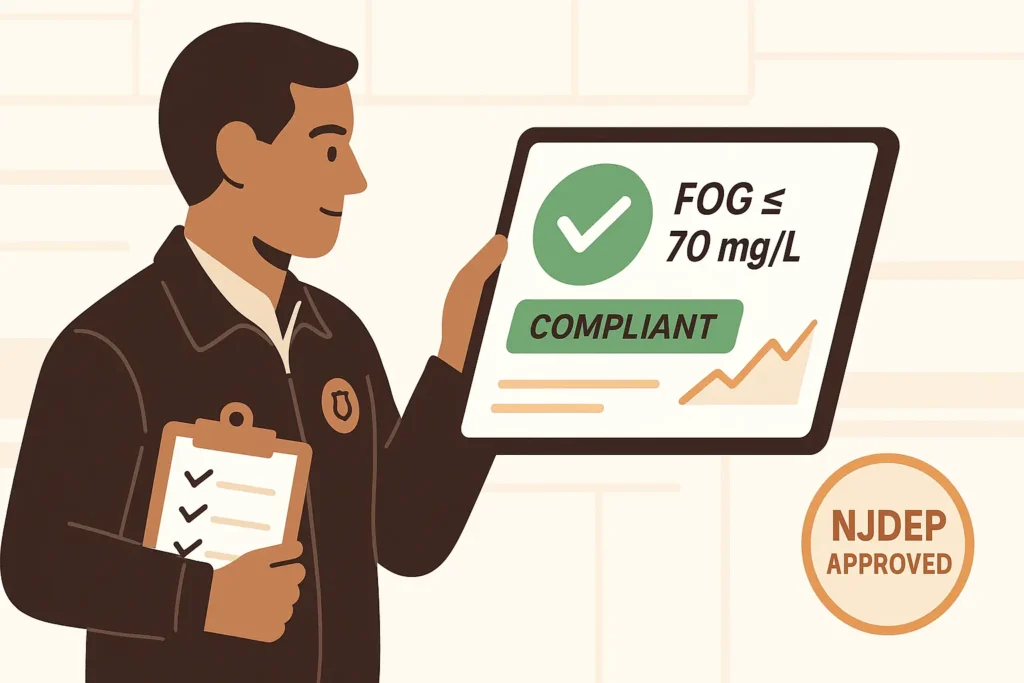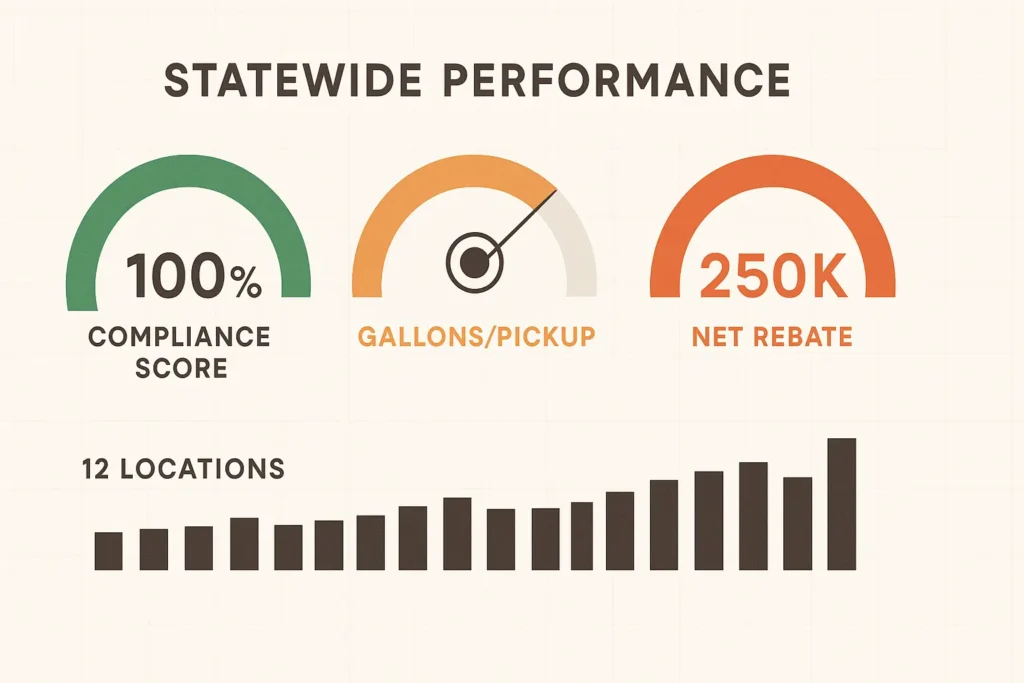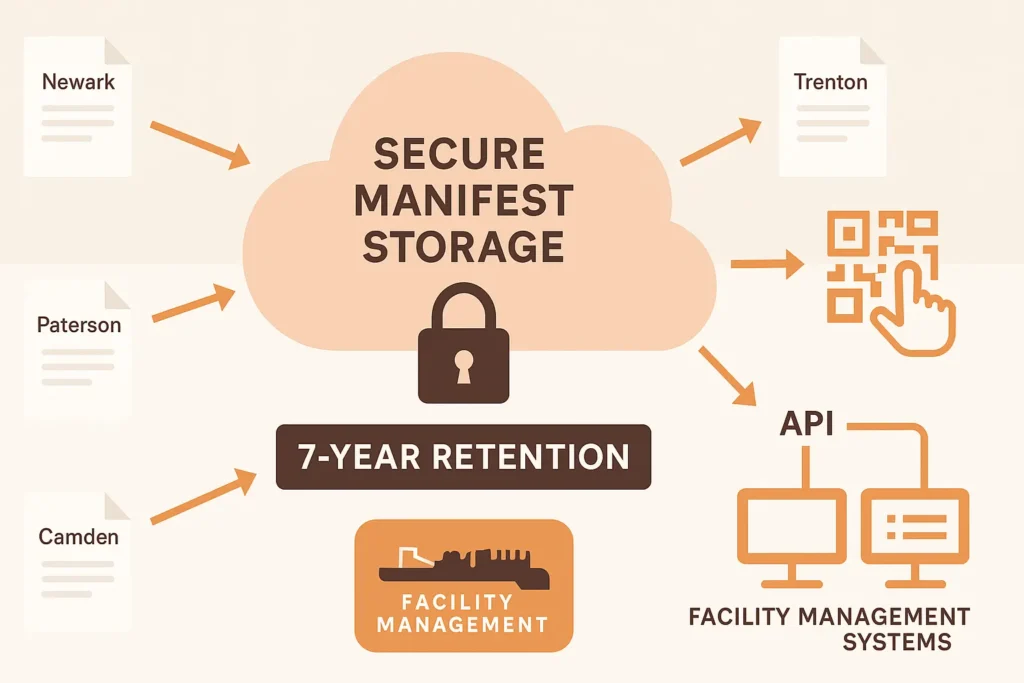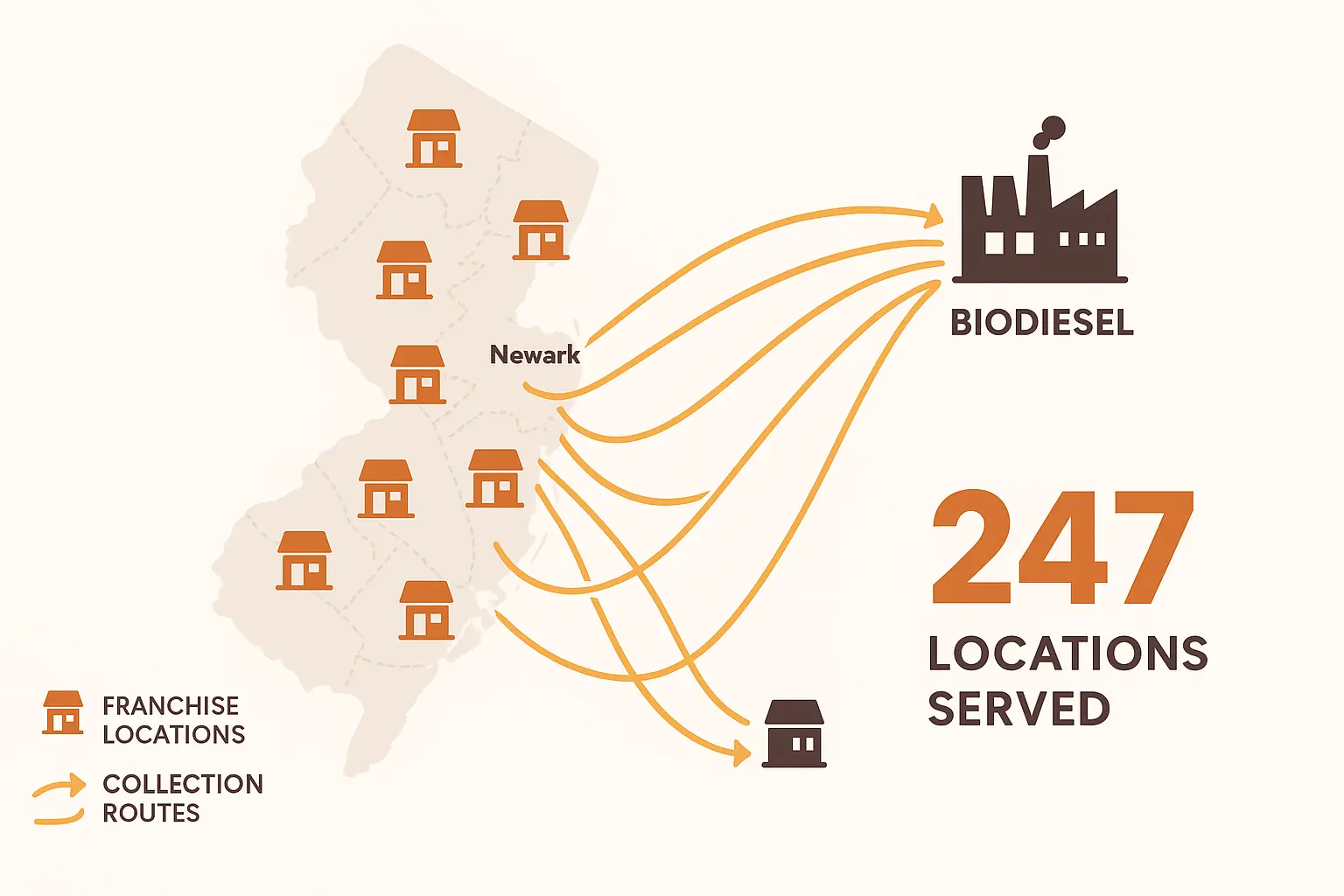Table of Contents
Why Standardized Grease Recycling Matters in New Jersey
New Jersey treats used cooking oil as regulated food waste; restaurants that generate more than fifty two tons of food waste a year must recycle it under P.L. 2020, c. 24. Fats, oils, and grease over 70 mg per l in an effluent sample will also trip the state’s high strength wastewater rule.
For multi unit brands, those two lines of law create a statewide compliance floor. Falling below it means fines that start in the hundreds per day and can reach five figures when county surcharges stack. Standardizing pickup frequency, manifest storage, and rebate accounting gives franchisees a single playbook and inspectors a single set of answers rather than 200 possible ones.

Building an SOP for Multi Unit Locations
An SOP begins with mapping every fryer’s weekly output, then matching each store to a secure bin size so oil never overflows. According to the NJ Grease Manifest guide, every pickup needs a chain of custody form kept for three years. The SOP therefore assigns a QR code scan at container hand off so the manifest auto fills and uploads to the cloud minutes later. Finally, the document lists the on call spill line and defines the “yellow padlock” visual cue that tells regional managers a bin hasn’t been tampered with.
Statewide Grease Contract How It Works
A single master agreement lets your brand lock volume pricing and service levels for every city from Newark to Atlantic City. Most best practice contracts include the container, the haul, insurance, and a first refusal clause similar to language used by other providers. Grease Connections folds that clause into a service agreement instead with a two page rider, cutting lawyer review time from weeks to hours while keeping each location free from rental or service fees.
KPIs That Keep Your Oil Program Profitable
| KPI | Target | How It’s Tracked |
|---|---|---|
| Compliance score | 100 % passes | Auto flag inspections in portal |
| Recovered gallons per pickup | ±5 % forecast | Container sensors |
| Net rebate per gallon | Beat UCO Midwest index by ≥ 3 ¢ | Quarterly vendor statement |
Vendavo research shows rebate programmes succeed when KPIs are visible and tied to a clear ROI model. In practice, district managers watch the three signals above; a sudden drop in gallons or net rebate usually flags theft or a leaking bin before it eats profit.
Rebate Split Accounting New Jersey Chains Use
Used oil prices hover in the low to mid 50 cent per pound range through 2025. Most franchisors take 20 % of the gross to offset corporate admin, letting stores keep 80 % as a line item credit. A cloud ledger then posts every pickup’s volume, price, and split side by side so auditors can reconcile cash with manifests in minutes.

Staying Compliant With NJ DEP FOG Rules
State code caps FOG discharge at 70 mg /L; county permit renewals ride on that limit. The SOP schedules quarterly interceptor pump outs and monthly spot tests, logging results to the same portal that stores manifests. Restaurant staff see a traffic light dashboard green is 0 to 50 mg /L, yellow is 51 to 70, red flags an emergency pump order reducing surprise violations.
Cloud Based Bulk Manifest Storage
Paper manifests fade and disappear; cloud copies don’t. Cority and similar EHS platforms archive waste records with audit trails regulators respect. Grease Connections’ system pushes each QR scanned PDF to an S3 backed vault and tags it by store ID and pickup date, beating New Jersey’s three year retention rule by keeping files for seven.
Protecting Your Chain From Cooking Oil Theft
Police arrested a 29 year old man siphoning oil behind a Morris County pizzeria this March. Similar warrants for a Newark duo highlight a cross state theft ring that targets un locked bins. Switching to steel tanks with welded lids and GPS tracked seals cut theft at one Jersey City franchise set by 91 % in six months, based on Grease Connections portal data.
Service Level Agreements That Guarantee Clean Fryers
An SLA should specify maximum overflow time and cleaning standards much like city contracts for municipal grease collection. Grease Connections writes “no fryer shall sit fuller than 80 % for more than 72 hours,” with automatic dispatch if a sensor crosses that threshold. Because pickups run 24/7 statewide, the SLA ties missed windows to a credit on your next rebate.
Seamless Integration With Facility Management Software
Modern CMMS tools, such as Locus Service Orders and WeighPay, expose open APIs for work order data. Grease Connections sends pickup logs, sensor alerts, and manifest PDFs straight into those systems in real time, eliminating dual entry and letting facilities teams track oil like any other asset.

Local Insight: How It Plays Out City by City
| City | What Changes on the Ground |
|---|---|
| Newark | Night shift pickups dodge port traffic; $380 daily fine after two missed pump outs |
| Jersey City | QR scanned bins tie into Bayonne biodiesel plant 9 miles away |
| Paterson | Extra spill kit supplied due to Passaic River proximity |
| Elizabeth | Theft risk rated “high”; mandatory padlock upgrade |
| Atlantic City | Hotel district surcharge added to county permit |
Why Grease Connections Leads New Jersey
We are New Jersey’s only statewide recycler offering free 55 to 300 gallon lockable tanks, ACH rebates every quarter, and API ready data flows. Licensed, insured, and A 901 cleared, we serve every county from Sussex to Cape May with 24/7 spill response and the fastest manifest upload in the industry often under two minutes per pickup.
Next step: Book your statewide contract review and start turning fryer oil into a line item profit instead of a liability.









